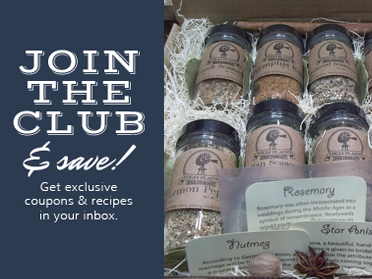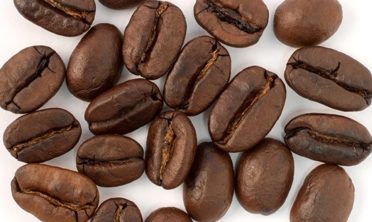The Difference Between Spices & Herbs
Often the terms “spices” and “herbs” seem to be used interchangeably. In fact, there is a distinct difference between what is considered an herb and what is considered a spice. Simply put, the leaf of a plant used in cooking is referred to as a culinary herb, while any other part of the plant is termed a spice. Spices can be buds (cloves), bark (cinnamon), roots (ginger), berries (allspice), seeds (caraway), and even the stigma of a flower (saffron). Spices are most often used dried, while culinary herbs can be used fresh or dried. Vegetable material, such as onion and garlic, are classified with herbs when they are used fresh, but often referred to as spices when they are dried. Some plants even yield both herbs and spices. The most common of these is Coriandrum sativum, a plant whose leaves are known as cilantro (an herb), while its seeds are called coriander (a spice).

Fresh vs. Dried
“Fresh” can often be a confusing term when applied to herbs and spices. “Fresh” can mean, “freshly picked, not dried, frozen or processed in any way,” or it can be referring to the age of a dried spice, as in “not old and tasteless.” Today’s “Fresh is Best” food trends can further muddy the waters by leading us to believe that we have to use “fresh everything” if we want to make a healthy and flavorful meal. A fresh (not dried) spice many not always be the best option. When deciding between fresh and dried, it is important to consider what is most appropriate for the dish you are preparing.
People have been drying herbs and spices for various reasons for centuries, the most common of these reasons being preservation. Drying herbs and spices preserves them in an easily storable form for use when the fresh alternative is not available. Drying has also allowed people all over the world to experience different types of spices and herbs that do not grow naturally in their home climates.
Another important reason for drying herbs and spices, particularly spices, is that the drying process generates certain enzymatic reactions within the spice that actually creates the distinctive flavor the spice is know for. Many spices would be inedible or ineffective if not for the drying process. Bay leaves are extremely bitter when fresh, but drying mellows this bitterness and brings out the lovely flavor we associate with them. Drying peppercorns in the sun turns them black and allows the volatile oil piperine to form, which gives pepper its unique taste. This same reaction is also working to fully develop the flavors of spices like vanilla, cloves, allspice, nutmeg, and cardamom, along with many others.
Drying herbs also changes them into a form that more readily imparts their flavor into the food being cooked. When an herb is dried, the water content is removed, leaving a dried leaf with a much more concentrated flavor. A good rule when using dried herbs is to use 1/4 to 1/3 of what you would use of the fresh herb.
When selecting a dried or fresh spice/herb, think about the flavor you wish to add to your dish. If you are making a long cooking dish, such as a stew, casserole or sauce (like Bolognese or marinara), dried herbs with their more robust flavor will hold up better during the cooking process and infuse their flavors more easily into the food. Fresh herbs can be added to these types of dishes toward the end of the cooking process (10-20 minutes remaining), so their delicate flavors are not degraded. Quick cooking dishes and salads can greatly benefit from the use fresh herbs,
as dried herbs can lose what are known as the “fresh top notes.” These fresh notes are particularly noticeable in herbs like cilantro, basil, lemongrass, chives, and parsley.
Storing Herbs & Spices
Spices and herbs derive their flavor from volatile oils found in their cellular structure. Over time these compounds begin to break down, a process that causes the flavor and aroma of the spice or herb to dissipate. Because of this, it is best to purchase spices in quantities that can be used in a relatively short amount of time. It is also best to purchase or store spices in glass jars with airtight lids. Thick plastic bags with a re-sealable closure are also a good option. However, it is best to avoid cellophane packs, as these allow the volatile oils to escape and oxygen to enter the packet which causes your spices to begin to deteriorate even before you purchase them.
Should spices be stored in the refrigerator?
Although refrigeration is generally associated with prolonging freshness, when it comes to dried spices it is not necessarily the best option. Keeping spices in the refrigerator does little to prolong their shelf life and can actually cause the spices to absorb off-putting flavors from other items in the refrigerator if they are not stored in airtight containers. We suggest simply storing spices and herbs in a cool, dry place, away from direct sunlight, to maximize shelf life. Fresh herbs however, can be stored in a refrigerator along with other produce. Although it may be tempting, it is best to avoid storing spices next to a hot stove, as this will cause them to degrade more quickly.

Shelf Life of Spices
When spices and herbs are stored in correct containers, in a cool, dry place away from direct light and heat, their optimum shelf life can be realized. For dried herbs, optimum shelf life is 6 to 9 months, sometimes up to a year for more robust herbs. To test dried herbs for freshness, simply put a few leaves in the palm of your hand and rub back and forth with your thumb. If the aroma generated by this action is noticeable and pleasant then your herbs are okay to use. If the smell is musty, straw-like, grassy, or non-existent it is best to discard your herbs and start over with fresh stock.
The shelf life for ground spices is much the same as for herbs; 6 to 9 months is ideal, with some spices lasting up to a year. If you are concerned about the freshness of your dried spices, simply smell them. If you can detect some aroma and pungency, then the spices are still acceptable for use.
Whole seed spices like cumin seed, dill seed, caraway seed, or cloves can last for as long as 3-5 years if stored properly. This includes peppercorns, cinnamon sticks, allspice berries, and whole bay leaves. Saffron can be stored for as long as 7 years. To check the freshness of whole spices, simply break off or grind up a piece of the spice. Just like herbs, if you can still detect a pleasant aroma then your spices are good to use.





Reader Interactions